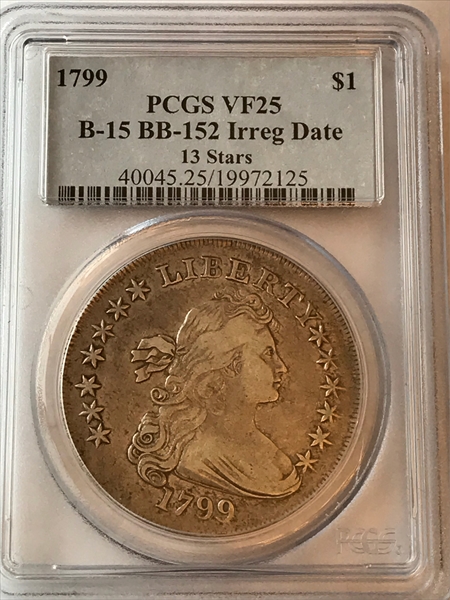1799 $1 BB-152 VF25 认证号19972125, PCGS号40045
专家评论
Q. David Bowers
The following narrative, with minor editing, is from my "Silver Dollars & Trade Dollars of the United States: A Complete Encyclopedia" (Wolfeboro, NH: Bowers and Merena Galleries, Inc., 1993). Note: the Notable Specimens list should be used with caution - it has been updated in my 2013 edition of "The Encyclopedia of United States Silver Dollars 1794-1804.""Blundered Stars Reverse."
Line star pattern on reverse (only 1799 of this style).
Reverse of 1798 (Bolender 15, Haseltine 15)
OBVERSE 2: See description under 1799 BB-151, so-called Irregular Date.
Obverse die used to strike 1799 BB-151 (first use), BB-152 (intermediate use), and BB-153 (final use).
REVERSE E: Reverse of 1798. Struck from the same die as BB-123 and BB-124 of the 1798 dollars. The 5 berries are the smallest of any variety of the 1799 date. A die crack joins stem end to border below. This is significant as the only 1799 dollar with a "line pattern" of stars on the reverse (as explained in the general introduction to 1798 dollars in this book). Most seen are very weakly struck on the reverse stars (but not as weak as on 1798 BB-124, on which the weakness was caused by an extensively damaged lower right obverse die being opposite on the coin). Far right edge of A is over cloud 3.
Reverse die used to strike 1798 BB-123 (earliest state), BB-124 (intermediate state, now relapped); and 1799 BB-152 (latest state).
DIE STATES:
Die State I: Perfect dies. No obverse cracks. Reverse always with crack from stem, as inherited from 1798 BB-123 and BB-124. May not exist without obverse cracks.
Die State II: Obverse die with hairline crack from left side of 1 in date through stars 1-4 to border opposite star 5. Bolender's personal coin was of this die state. Not seen by author.
Die State III: Obverse die with additional hairline crack from star 9 to field near star 11. Scarcer die state than the following.
Die State IV: Bolender-15a. Obverse die with further cracks: Hairline crack from center of star 4 through star 7. Separate hairline crack from center of star 7 through LIBE. Crack from right side of R, through bottom of T, below Y, to field. Crack from Y through atars 8, 9, and 10 to bust (expansion of earlier crack from star 9 to field near star 11). 1975 ANA Convention Sale (Superior):951 coin; EF-40, is from the Bolender and Ostheimer collections. This is the most plentiful die state of 1799 BB-152.
COLLECTING NOTES: 1799 BB-152 is among the scarcer varieties of the year, however, a nice example can be found without undue difficulty. I believe that 300 to 500 exist. Haseltine in his day considered this variety to be very rare. As is the case with other early dollars of which several dozen or more exist, the number of coins available exceeds the number of dedicated collectors by die varieties, thus providing the opportunity to acquire a rarity for little more than a "type" price. Most examples of 1799 BB-152 are in lower grades. Any coin grading AU or better is especially notable. Only a few Mint State coins exist.
NOTABLE SPECIMENS:
Auction '85 Specimen. MS-60. Stack's, Auction '85, 1985:1751. "Choice BU, shimmering mint lustre with delicate golden olive toning."
Pine Tree Specimen. AU-55. Pine Tree, Suburban Washington Convention Sale, 1975:246. "Brilliant AU+, nearly free of bagmarks, none worth special description except shallow rim nick above ST; sharp stars and curls."
Brooks Specimen. AU-50. Bowers and Merena Galleries, Brooks Collection, 1989:239. "The surfaces have pearl gray and light champagne coloration, and much of the original mint lustre still survives in the fields. A shallow planchet lamination flaw can be seen towards the center of the eagle's shield."
DeCoppet Specimen. AU-50. Andre DeCoppet Collection, James F. Kelly, 1955. Lester Merkin, AJ. Ostheimer, 3rd Collection, 1968:286. "More or less Unc., irregular blue toning, uneven and somewhat weak strike. Planchet defect at edge near first two stars, showing also at left wing tip. Reverse, crack extended through wing tip and field towards right, unmentioned by Bolender and RR."
Turoff Specimen. AU-50. Bowers and Ruddy Galleries, Julius Turoff Collection, 1976:1380. "Very lovely AU with a generous quotient of original mint lustre present."
Baldenhofer Specimen. EF-45. W. G. Baldenhofer to Stack's, Farish-Baldenhofer Sale, 1955, K.P. Austin Collection. AJ. Ostheimer, 3rd Collection, Superior Galleries, ANA Convention Sale, 1975:950. "Early die state. Not quite AU-50, dull frosty tone with a speck here and there of iridescent tone. Needle-sharp where fully struck up, but there are many file marks on Liberty's bust and correspondingly very weakly struck up on the reverse which is also off center."
Ron Guth
The "Irregular Date" is a single obverse die with the final 9 placed well below the arc formed by the bases of the first three digits. This obverse was paired with two different reverse dies, resulting in the rare BB-151 and the semi-scarce BB-152.
We know of at least three Mint State examples of the B-152 variety, each is listed in the Condition Census above. As Dave Bowers noted below, any BB-152 in AU or better is a significant example.
PCGS #
40045
设计师
Robert Scot
边缘
Lettered: HUNDRED CENTS ONE DOLLAR OR UNIT
直径
40.00 毫米
重量
27.00 克
铸币数量
423515
金属成分
90% Silver, 10% Copper
更高评级数量
25
评级较低的钱币数量
6
地区
The United States of America
价格指南
PCGS 数量报告
拍卖 - PCGS 评级的
拍卖 - NGC 评级的






















